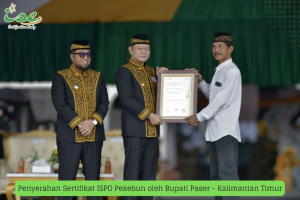Indonesian Sustainable Palm Oil (ISPO) certification is a certification applied in Indonesia to identify and recognize sustainably produced palm oil that complies with criteria set by the Indonesian government. The goal is to promote environmentally, socially, and economically friendly practices in palm oil plantations.
ISPO is the Indonesian government's response to environmental and social issues associated with the palm oil industry, including deforestation, habitat loss, and social problems with indigenous communities and plantation workers. By implementing ISPO certification, Indonesia aims to improve the quality and sustainability of palm oil production while ensuring a more positive impact on the environment and communities.
Some key points related to ISPO:
- Sustainability Principles: ISPO is based on sustainable principles, including environmental protection, social well-being, economic efficiency, and legal compliance.
- Criteria-Criteria: ISPO establishes standards and criteria that must be met by oil palm plantations seeking certification. These criteria involve various aspects, including land management, pesticide use, workers' rights, and legal obligations.
- Proses sertifikasi: Proses sertifikasi ISPO melibatkan audit oleh pihak yang diakreditasi oleh Badan Pengawas Kelapa Sawit (BPKS). Pada akhirnya, perkebunan yang memenuhi kriteria akan diberikan sertifikat ISPO.
- Label and Promotion: Products that use ISPO-certified palm oil can use a label or identification mark indicating the sustainability of the product. This helps consumers identify products produced according to sustainable principles.
ISPO certification aims to create a more environmentally and socially friendly palm oil supply chain and promote more sustainable practices throughout the Indonesian palm oil industry. While ISPO is a significant step towards achieving sustainability in the palm oil industry, there are still debates and challenges related to its implementation and effective oversight.












